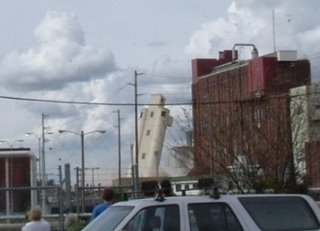
Found this in a folder from last summer's walking along the bay. Zoom lens.
"Happy New Year."
 It's a power plant. See also Future heating district for Bellingham?
It's a power plant. See also Future heating district for Bellingham? 
 Riding my bike around town snapping images. With energy issues making news, here is the cooling tower and power lines by Encogen power plant in Bellingham. Kind of like "found art." Modern art.
Riding my bike around town snapping images. With energy issues making news, here is the cooling tower and power lines by Encogen power plant in Bellingham. Kind of like "found art." Modern art.
 We had a white Christmas this year, rare for Bellingham. Glad we can still have white Christmases occasionally.
We had a white Christmas this year, rare for Bellingham. Glad we can still have white Christmases occasionally. Whatcom Creek in the snow at Cornwall Ave.
Whatcom Creek in the snow at Cornwall Ave. View at State and Magnolia Dec. 13.
View at State and Magnolia Dec. 13. Someone sent this to a mail art show I compiled in the 1980s. I'm not sure where this picture was taken or what magazine it was cut out of. I used it in a collage.
Someone sent this to a mail art show I compiled in the 1980s. I'm not sure where this picture was taken or what magazine it was cut out of. I used it in a collage. Both Congress and President elect Obama are talking large stimulus packages. Government becomes the "consumer of last resort" and, if done properly, it can buy things we really need. Things like transportation infrastructure and affordable housing. The private market hasn't been bringing enough of what we really need.
Both Congress and President elect Obama are talking large stimulus packages. Government becomes the "consumer of last resort" and, if done properly, it can buy things we really need. Things like transportation infrastructure and affordable housing. The private market hasn't been bringing enough of what we really need. 
 Recent news that seven orca whales are missing from the count in Puget Sound adds to worry over the health of the whales. It's presumed the whales may be dying out from various factors including starvation from lack of salmon.
Recent news that seven orca whales are missing from the count in Puget Sound adds to worry over the health of the whales. It's presumed the whales may be dying out from various factors including starvation from lack of salmon.  Painted wall of Parberry's in Bellingham near recycling yard.
Painted wall of Parberry's in Bellingham near recycling yard. That's what the city of Bellingham, the port district and the public have been doing for several years with the waterfront land being vacated by Georgia Pacific West.
That's what the city of Bellingham, the port district and the public have been doing for several years with the waterfront land being vacated by Georgia Pacific West.  Draft Environmental Impact Statement of New Whatcom Redevelopment Project is now available for free on two CDs, but if you want the printed (Luddite) version, it will cost you $120 and you'd better bring a forklift.
Draft Environmental Impact Statement of New Whatcom Redevelopment Project is now available for free on two CDs, but if you want the printed (Luddite) version, it will cost you $120 and you'd better bring a forklift.  Not real long after the last toilet paper rolls leave former Georgia Pacific warehouse in Bellingham, a new use for most of that facility has been found; a temporary use at least.
Not real long after the last toilet paper rolls leave former Georgia Pacific warehouse in Bellingham, a new use for most of that facility has been found; a temporary use at least.



 Old Georgia Pacific paper mill being torn down. Image taken a few weeks back.
Old Georgia Pacific paper mill being torn down. Image taken a few weeks back.  Picture of ivy growing in the shape of a heart in Bellingham. On the side of the Old Granery Building, Bellingham Central Waterfront. Fate of that building is still to be determined as part of the old GP / Central Waterfront rehabilitation process.
Picture of ivy growing in the shape of a heart in Bellingham. On the side of the Old Granery Building, Bellingham Central Waterfront. Fate of that building is still to be determined as part of the old GP / Central Waterfront rehabilitation process.

 Surprise, I actually got it in a picture.
Surprise, I actually got it in a picture.